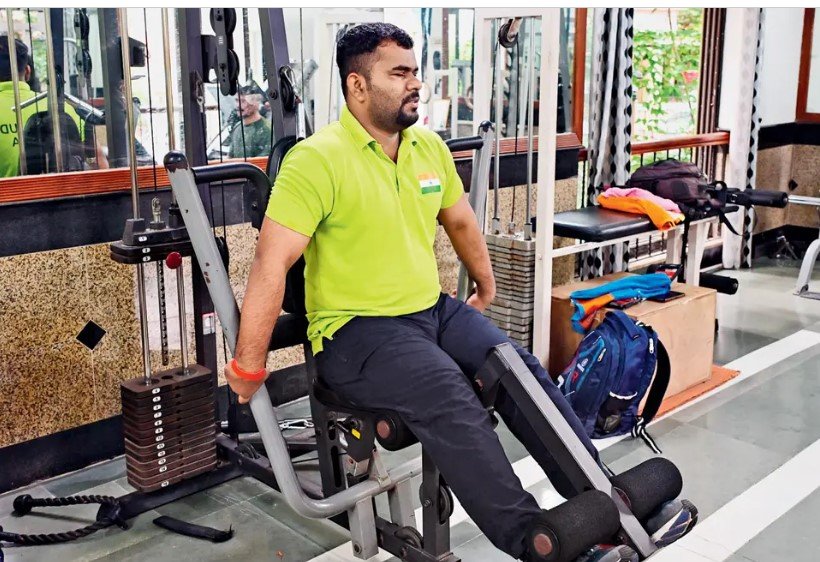Darshan Arun Kamble, a 100% blind para judoka from Borivli, is ready to take his skills to an international stage, representing India at the IBSA Judo Grand Prix in Giza this week.
From Borivli Gym to Global Arena
Kamble’s story doesn’t start with medals or fame. It starts in a modest home in Borivli East, Mumbai, where his father works as a tempo loader and his mother manages the household. Despite the financial strain, his journey in judo began with an unshakable belief — that his lack of sight would never limit his vision for success.
After years of disciplined training, he has earned his place among India’s best para judokas. The 2025 IBSA Judo Grand Prix in Giza, Egypt — running from August 14 to 20 — will see him compete against elite athletes from across the world.
The timing is critical. Kamble just wrapped up an intense training camp in Lucknow, where he sharpened his throws, holds, and grip strength ahead of the competition. Now, he’s set to swap the familiar mats of his Mumbai gym for the international spotlight.
The Man Beside the Mat
Every athlete has a support system, and in Kamble’s case, Dr. Rajesh Mayekar has been that anchor. Mayekar, a longtime mentor, has guided him through not just training routines but also the logistical and emotional hurdles that come with preparing for international events.
“He’s been like a rock for me,” Kamble says with quiet gratitude. “From finding training spaces to ensuring I have the right diet, he’s handled it all.”

This support has been critical. Para sports in India often struggle with funding gaps, meaning athletes like Kamble rely heavily on personal networks and community goodwill to cover travel, training, and equipment costs.
Training Without Sight
Judo is a sport that demands precision — the timing of a throw, the weight shift of an opponent, the exact pressure needed in a hold. For Kamble, the lack of sight means relying entirely on touch and instinct.
His training sessions are intense but adaptive. At the housing society gym in Borivli, he works on building raw strength with free weights. On the judo mat, he hones his ability to read opponents through subtle shifts in balance and grip tension.
One of his training partners, speaking between practice bouts, explained it best: “Darshan doesn’t need to see you to know what you’re going to do next. You take a step, he feels it in your grip, and the next second you’re on the mat.”
Egypt Beckons
The IBSA Judo Grand Prix isn’t just another tournament — it’s one of the most prestigious events in the para judo calendar. Hosted in Giza, against the backdrop of the Nile and the ancient pyramids, it draws competitors from across continents.
For Kamble, it’s both an opportunity and a challenge. The competition level will be far higher than national events, with athletes who have years of international experience. But there’s also the thrill of representing India in such a grand setting.
What’s at stake? Not just medals, but valuable ranking points that could influence qualification for future global events, including the Paralympics.
Roadblocks and Resilience
Getting to Egypt has been far from straightforward. Visa approvals, ticket costs, training expenses — each has been a hurdle. But Kamble’s community has rallied around him, raising funds and offering resources.
Some have even stepped in with small but vital gestures: a sponsor for his judo gi, discounted airfare, or gym access. Each contribution is a reminder that while sport is individual on the mat, it’s deeply collective off it.
The Bigger Picture for Para Sports in India
Kamble’s journey also highlights the broader issue of para athlete support in India. While mainstream sports attract corporate sponsorship and government backing, para athletes often work in the shadows, fighting for recognition and resources.
Events like the IBSA Grand Prix bring visibility, but advocates say it’s not enough. More structured funding, better training infrastructure, and consistent exposure could transform India’s para sports scene.
Still, stories like Kamble’s offer a glimmer of what’s possible. His rise from a small gym in Borivli to competing on an international stage shows the untapped potential within India’s para sports talent pool.
What Lies Ahead
Once the Grand Prix kicks off in Giza, Kamble will face athletes from countries with far more developed para sport programs. But if there’s one thing his story has proven, it’s that determination can bridge many gaps.
Back in Borivli, neighbors and friends are already making plans to follow updates from Egypt. For them, Kamble isn’t just a sportsman — he’s a symbol of grit and pride.
And for Kamble himself? The focus is simple: step on the mat, give everything, and let the results speak. “Winning would be great,” he admits, “but the real win is standing there in India’s colors, knowing I made it here.”
